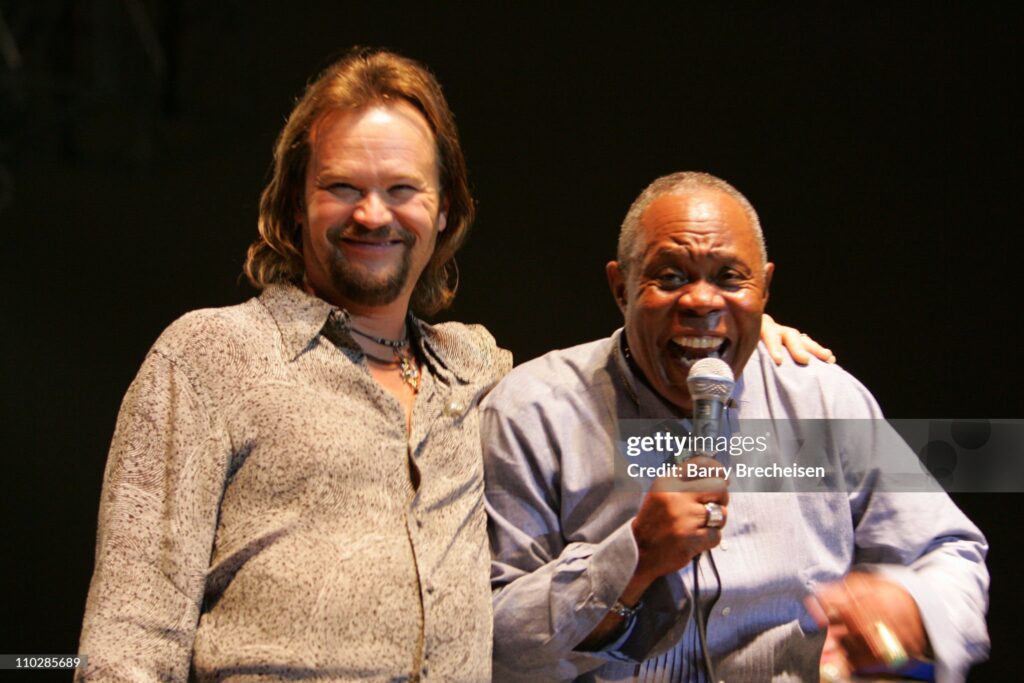
A wink and a boot-stomp—working folks crashing the velvet rope with a pun and a grin.
Let’s park the facts right up front. “Country Club” was Travis Tritt’s debut single, released August 7, 1989, and the title track of his first major-label album Country Club (Warner Bros. Nashville, LP out February 22, 1990). Written by Catesby Jones and Dennis Lord, produced by Gregg Brown, it climbed to No. 9 on Billboard’s Hot Country Singles & Tracks and No. 22 on Canada’s country chart. The 45’s B-side was “Sign of the Times,” and the first-ever Travis Tritt music video—shot for this song—was directed by Jim May.
The premise is pure barroom theater. A woman at a literal country club says only members are allowed; the narrator flashes a smile and answers that he’s a member of a different country club—the one with Telecasters, steel guitars, and a dance floor that understands sore backs and long weeks. It’s a dad-joke of a hook that lands like a small revelation, because the song isn’t just flirting—it’s drawing a line between status and spirit. Tritt’s vocal keeps that line bright: a touch of Georgia drawl, a little laugh in the throat, no apology for where he comes from. You can almost see the head tilt when he leans into the title phrase.
There’s a tidy origin story behind that grin. Co-writer Dennis Lord has told how the idea sparked after a brush with a snooty gatekeeper at a real country club; he carried the notion to Catesby Jones, and the pair shaped it into the neat little double meaning we know. It’s the kind of Nashville tale older listeners recognize: a mild insult turned into a sing-along that levels the field. (And long before Tritt cut it, Alan Jackson reportedly sang the demo—one of those “thirty bucks and a handshake” jobs that seasoned Music Row folks smile about now.)
What you hear on the record is uncomplicated craft. The tempo walks, not sprints. A pocket of snare-and-bass that makes your shoulders move without asking permission. A friendly squall of harmonica. Fiddle lines from Mark O’Connor that flicker like neon. The pickup band is a murderer’s row of Nashville pros—Mike Brignardello (bass), Larry Byrom (acoustic), Terry Crisp (steel), Gregg Galbraith (electric), Mike Rojas (piano), Steve Turner (drums)—plus harmony from Dana McVicker and Dennis Locorriere. Every part is there to keep the floor full and the smile wide.
If you lived through the winter of ’89–’90, you may remember how fresh this felt on the radio. Country was starting to boom again, but plenty of singles still sounded airbrushed; “Country Club” rolled in with Bakersfield snap and roadhouse cheer, a calling card for the way Tritt would stitch Southern rock into modern country without sanding off the twang. Drop the needle and you hear the mission statement that his debut album would flesh out a few months later: love the classics, play them loud, and write about regular people without condescension.
Part of the record’s charm—especially if you’ve got some years on the odometer—is how politely rebellious it is. There’s no chip on the shoulder; there’s just confidence. The narrator isn’t begging to be let in; he’s inviting the room to his side of the rope, where membership dues are paid in honest work and a good chorus. That’s why the hook never curdles, even after thousands of spins. It’s teasing, not sneering. You can dance to it on a Friday night and still hear its little truth on a Monday morning: belonging has less to do with dress codes than with what makes your heart beat in time.
Listen closely to Tritt himself—early-career but already sure of his lane. He rides the groove like a man who’s played enough beer joints to know where the jokes land and where the feel has to take over. There’s restraint in his phrasing (no grandstanding runs), a conversational ease that turns a wordplay hook into a welcome mat. That’s why older ears keep this one close: it’s light on its feet, but it carries a grown-up’s sense of self.
Even the video—all denim, bandstand, and good humor—understood the assignment. No storyline, just proof of life: a singer with a band that can swing, a room that gets the joke, the kind of clip that made early-’90s country TV feel like an invitation rather than a spectacle. It helped turn an unknown into a voice you recognized by bar two.
And if you’re the ledger type, the numbers still smile: US Country No. 9, Canada Country No. 22, a first single that did exactly what debut singles are supposed to do—announce the tone, the attitude, and the company you keep. By the time the album Country Club arrived in ’90, the sign over the door was clear: this was a place for Telecaster bite, fiddle laughter, and plain talk about who gets to belong. The song didn’t just open a career; it opened the club most of us wanted to join.